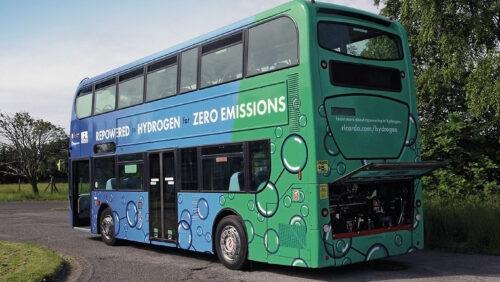US +1800 764 0366 | Europe & Middle East +44 (0)115 980 3800 | Asia-Pacific: +61 2 7227 5369
Luxfer Gas Cylinders collaborate with Ricardo on zero-emissions double decker, trialled in Brighton following Teesside tests
An ambition to deploy 150 zero-emissions hydrogen powered buses on UK routes by 2024 could be a step closer, thanks to a partnership between Luxfer Gas Cylinders and global engineering consultants Ricardo.
Joining forces for the first time, world-leading gas cylinder manufacturer Luxfer supplied its alternative fuel expertise to Ricardo, supplying a fit-for-purpose hydrogen storage solution for a Stagecoach North East prototype double decker bus.
The hydrogen powered bus, which was converted from a diesel engine to run on fuel cell technology, underwent trials in Teesside for six weeks, before being put through its paces on hilly routes around Brighton and Hove.
The project, part funded by the Department for Transport, through its Hydrogen Transport Hub Demonstration competition, aims to demonstrate the benefits of hydrogen as a sustainable passenger transport option by extending the life of existing diesel buses.
Nick Herbert, Sales and Marketing Director at Luxfer Gas Cylinders, explains: “Supporting the UK transport sector’s shift from diesel and petrol to more sustainable fuels means we need to offer options that are not only clean and green, but commercially viable too. Many operators who have invested in diesel vehicles are now left with stock that has a much shortened lifespan. Retrofitting buses to run on hydrogen makes sense, and at Luxfer we have the capability to work with partners to bring bespoke projects to fruition.
“Companies, like Ricardo, are making strides in adopting hydrogen technology, and we’re proud of our role in providing the right environment for others to do the same.”
Ricardo is showcasing the hydrogen fuel cell re-powered vehicle to operators, seeking to offer it at around half the price of a new bus. The aim is to secure 50% match funding investment plus customer commitment for an initial production of 150 buses that could enter service from late 2024.
Andrew Ennever, Head of Electrification, at Ricardo, said: “This project has real potential to support bus operators in their environmental strategies. With an excellent track record in the sector, we chose to partner with Luxfer because their hydrogen cylinders best aligned with the design we had in mind, and the team had experience of supplying this product to other bus manufacturers for conversion projects.
“Timescales were also important. We needed a tight turnaround and Luxfer were able to get what we needed quickly, providing support to design and manufacture the cylinder frames for a complete H2 delivery system.”
The vehicle features Luxfer’s proprietary G-Stor™ H2 cylinders, as part of a five-cylinder system within a bespoke modular frame, holding 24.5kg of hydrogen.
The prototype has a fuel consumption of 17km/kg (5.88kg/100km) of hydrogen and produces zero emissions when using green hydrogen. This consumption is comparable with current production FC buses, with further improvements possible in the production phase. Ricardo estimates 45,000kg of carbon dioxide emissions can be avoided by extending the life of existing buses rather than building from new.
Nick concluded: “This is an exciting project and we hope it is successful in convincing operators of the value in conversions, because retrofitting fleets will support the hydrogen infrastructure to scale up incrementally, which is critical.
“While the hydrogen economy is now gathering pace, this is not a new area for Luxfer – we’ve been pioneering gas storage solutions for 80 years and we can bring this legacy to bear on hydrogen systems for a whole range of applications.”
Luxfer’s alternative fuel expertise has been commissioned for a raft of world-first hydrogen transport projects. These include the UK’s first retro-fitted hydrogen trains, HydroFLEX 1&2, the world’s first commercial hydrogen truck fleet with Hyundai, the world’s first hydrogen tractor, 70 hydrogen double-decker buses operating across the UK, including Aberdeen and London, and Energy Observer – the world’s first self-powered sailing boat.
